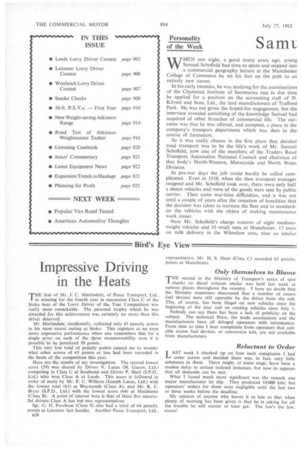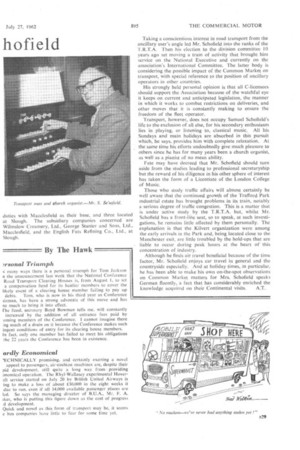Personality of the Week
Page 36

Page 37

If you've noticed an error in this article please click here to report it so we can fix it.
Sann hofield
WHEN one night, a good many years ago, young Samuel Schofield had time to spare and stepped into a commercial geography lecture at the Manchester College of Commerce he set his feet on the path to an entirely new career.
In his early twenties, he was studying for the examinations of the Chartered Institute of Secretaries and in due time he am:died for a position on the accounting staff of N. Kilvert and Sons, Ltd., the lard manufacturers of Trafford Park. He was not given the hoped-for engagement, but the interview revealed something of the knowledge Samuel had acquired of other branches of commercial life. The outcome was that he was offered, and accepted, a place in the company's transport department which was then in the course of formation.
So it was really chance in the first place that decided road transport was to be the life's work of Mr. Samuel Schofield, now one of the members of the Traders Road Transport Association National Council and chairman of that body's North-Western, Merseyside and North Wales Division.
In pre-war days the job could hardly be called complicated. Even in 1938, when the then transport manager resigned and Mr. Schofield took over, there were only half a dozen vehicles and most of the goods were sent by public carrier. Then came war-time difficulties, and it was not until a couple of years after the cessation of hostilities that the decision was taken to increase the fleet and to standardize the vehicles with the object of making maintenance work easier.
Now Mr. Schofield's charge consists of eight mediumweight vehicles and 10 small vans at Manchester, 17 units on milk delivery in the Wilmslow area, nine on similar duties with Macclesfield as their base, and three located at Slough. The subsidiary companies concerned are Wilmslow Creamery, Ltd., George Stanier and Sons. Ltd., Macclesfield, and the English Fats Refining Co., Ltd., at Slough. Taking a conscientious interest in road transport from the ancillary user's angle led Mr. Schofield into the ranks of the T.R.T.A. Then his election to the division committee 10 years ago set moving a train of activity that brought him service on the National Executive and currently on the association's International Committee. The latter body is considering the possible impact of the Common Market on transport, with special reference to the position of ancillary operators in other countries.
His strongly held personal opinion is that all C-licensees should support the Association because of the watchful eye it keeps on current and anticipated legislation, the manner in which it works to combat restrictions on deliveries, and other moves that it is constantly making to ensure the freedom of the fleet operator.
Transport, however, does not occupy Samuel Schofield's life to the exclusion of all else, for his secondary enthusiasm lies in playing, or listening to, classical music, All his Sundays and main holidays are absorbed in this pursuit which, he says, provides him with complete relaxation. At the same time his efforts undoubtedly give much pleasure to others since he has for many years been a church organist, as well as a pianist of no mean ability.
Fate may have decreed that Mr. Schofield should turn aside from the studies leading to professional secretaryship but the reward of his diligence in his other sphere of interest has taken the form of a Licentiate of the London College of Music.
Those who study traffic affairs will almost certainly be well aware that the continued growth of the Trafford Park industrial estate has brought problems in its train, notably a serious degree of traffic congestion. This is a matter that is under active study by the T.R.T.A. but, whilst Mr. Schofield has a front-line seat, so to speak, at such investigations, he remains little affected by them personally. The explanation is that the Kilvert organization were among the early arrivals in the Park and, being located close to the Manchester exit, are little troubled by the hold-ups that are liable to occur during peak hours at the heart of this concentration of industry.
Although he finds air travel beneficial because of the time factor, Mr. Schofield enjoys car travel in general and the countryside especially. And at holiday times, in particular, he has been able to make his own on-the-spot observations on Common Market matters for Mrs. Schofield speaks German fluently, a fact that has considerably enriched the
knowledge acquired on their Continental visits. A.T.
































































































































